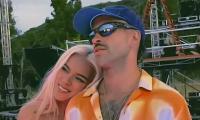42pc of Iqbal’s Urdu poetry never made it to his books: Dr Taqi Abedi
As one would expect from literary scholar and poet Dr Taqi Abedi, his speech on Allama Iqbal was a treat for every knowledge seeker in attendance at an event held on Sunday at the Anjuman Taraqqi-e-Urdu secretariat Urdu Bagh.
Born in Delhi in 1952, Dr Abedi is currently based in Canada, where he practises medicine. However, his medical profession did not prove to be a constraint for his passion for literature, as he has published a total of 73 books.
Two years ago, at the same venue, Dr Abedi had launched the complete poetic works of Firaq Gorakhpuri that he had compiled from various sources.
This time he came with his research on a bigger poet — Iqbal — who despite facing attacks from certain quarters still rightfully occupies one of the most prominent positions in the pantheon of Urdu literature.
It was the launch of a book compiled by him that contains the verses written by Iqbal that were rejected by him or not included in his books for reasons best known to him. The book is titled ‘Baqiyat-e-Iqbal’ (literally, remnants of Iqbal).
In his speech Dr Abedi shed light on the significance of studying the verses of great poets that they did not include in their books.
He said Ghalib was one poet who discarded a large number of his verses when he published his Diwans (poetry collections) in Urdu and Persian.
He added that in the preface to his Persian Diwan, Ghalib explicitly stated that his “rejected verses” not be included in his Diwan, but this did not deter scholars from searching for all the poetry composed by Ghalib.
It was Hali, Ghalib’s disciple and a major poet of Urdu, who first added some of those “rejected verses” in his Diwan, Dr Abedi said.
He added that Ghalib’s rejected verses were still being read and appreciated today, and some had attained a proverbial status in the Urdu language, like this couplet: “Hai Kahan Tamanna Ka Doosra Qadam Ya Rab / Mein Ne Dasht-e-Imkan Ko Aik Naqsh-e-Pa Paya”.
Turning towards Iqbal, the scholar said he published his first Urdu collection ‘Bang-e-Dara’ in 1924, while he had been composing poetry in Urdu as early as 1893, as his first ghazal was published that year in the magazine ‘Zaban’ in Delhi.
Dr Abedi explained that Iqbal did not focus on publishing his poetry in a book form despite his friends suggesting him to do so in letters written to him.
He added that Iqbal apparently published Bang-e-Dara in haste, as back-to-back two people had published his poetry in a book form without seeking his permission.
Iqbal personally knew one of those publishers. He expressed anger at the publication and ensured that all the copies of the book were burnt and destroyed.
The second collection was published in the Hyderabad state, which forced Iqbal to write a letter to the state authorities warning of a legal action.
According to the scholar, due to these incidents, Iqbal hastily published Bang-e-Dara after selecting his poems that he thought were worth publishing.
Dr Abedi made a startling disclosure that around 42 per cent of Iqbal’s Urdu poetry was not included by him in any of his collections. These rejected pieces include 63 ghazal, 92 nazm, 48 rubaiyat and 40 tareekh. Moreover, some parts of 121 nazm and 100 ghazal were omitted.
Dr Abedi recited a musaddas from ‘Jawab-e-Shikwa’ as well as some parts of ‘Himala’ that were omitted from Bang-e-Dara but were earlier published in magazines or booklets.
Discussing the reasons behind such omissions and rejections, the scholar said Iqbal was conscious of his Punjabi lineage, and he took extra care that whatever he wrote was linguistically correct because there were many puritan critics writing in magazines such as ‘Awadh Punch’ or Hasrat Mohani’s ‘Urdu-e-Mualla’ who would launch attacks on any poet whose language they found to be not according to their standards.
Dr Abedi even cited some letters by Iqbal in which he had asked Syed Suleman Nadvi to correct his work or expressed his desire of meeting Nazm Tabatabai so that he could learn nuances of language from him.
Even a genius like Iqbal had to do odd jobs to make ends meet, Dr Abedi said, adding that once Iqbal was part of the team that finalised school curriculum.
During this job he penned 13 poems for children that were included in textbooks, but alas without his name. The speaker recited one of such poems titled ‘Mehnat’, which was as good as other poems for children by Iqbal.
He also admitted that this was not the first attempt to publish such “rejected” verses by Iqbal, as it was the ninth such book. Dr Abedi said he had reviewed all the books dealing with Iqbal’s rejected verses that had been earlier published.
He explained that the first such compilation was published by Anwar Harris in 1951, and later scholars and researchers like Ghulam Rasool Mehr, Syed Abdul Wahid and Hamza Alavi tried to bring forth such poems by Iqbal that were not included by him in any of his books.
Dr Abedi also spoke of the Persian verses by Iqbal that he did not publish in any of his books. He said he had found those verses and included them in Baqiyat-e-Iqbal with translation.
-
 Blake Lively Gushes Over Ryan Reynolds Amid Feud With BFF Taylor Swift
Blake Lively Gushes Over Ryan Reynolds Amid Feud With BFF Taylor Swift -
 Prince William 'furious' At Meghan Markle, Harry
Prince William 'furious' At Meghan Markle, Harry -
 Church Under Investigation After Anti-ICE Protest Interrupts Worship
Church Under Investigation After Anti-ICE Protest Interrupts Worship -
 UK Govt Tightens School Rules On Phones And Social Media
UK Govt Tightens School Rules On Phones And Social Media -
 Fernando Mendoza’s Mom Steals Hearts After Indiana Wins National Championship
Fernando Mendoza’s Mom Steals Hearts After Indiana Wins National Championship -
 'I Don't Care': Trump Shrugs Off Nobel Prize Talk As Greenland Tensions Escalate
'I Don't Care': Trump Shrugs Off Nobel Prize Talk As Greenland Tensions Escalate -
 King Charles Risks Facing Backlash As His Punishment Not Enough For Andrew
King Charles Risks Facing Backlash As His Punishment Not Enough For Andrew -
 Canucks Losing Streak Reaches 11 Games After Islanders Defeat
Canucks Losing Streak Reaches 11 Games After Islanders Defeat -
 'Industry' Creators Reveal Most Common Message They Get From Fans In Finance
'Industry' Creators Reveal Most Common Message They Get From Fans In Finance -
 Alarming: Rising Shark Attacks Force Australia To Close Beaches
Alarming: Rising Shark Attacks Force Australia To Close Beaches -
 Lily Allen Takes Side In Brooklyn, Nicola's Feud With David, Victoria Beckham
Lily Allen Takes Side In Brooklyn, Nicola's Feud With David, Victoria Beckham -
 Northern Lights Glow Across US, UK , Europe After ‘rare’ Solar Storm Hits
Northern Lights Glow Across US, UK , Europe After ‘rare’ Solar Storm Hits -
 Karol G Parts Ways With Beau Feid After Three Years Of Dating
Karol G Parts Ways With Beau Feid After Three Years Of Dating -
 'DWTS' Pro Gleb Savchenko's Mystery Love Interest's Identity Revealed
'DWTS' Pro Gleb Savchenko's Mystery Love Interest's Identity Revealed -
 Meghan Markle’s Father ‘plans To Leak’ Her Letter Despite Privacy Efforts?
Meghan Markle’s Father ‘plans To Leak’ Her Letter Despite Privacy Efforts? -
 Woody Harrelson Reveals Creative Clash With Matthew McConaughey On 'True Detective'
Woody Harrelson Reveals Creative Clash With Matthew McConaughey On 'True Detective'



